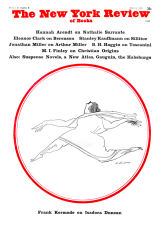My dear Boy,
I have lately been reading an interesting selection of letters which have been written through the ages by fathers—mostly famous—to their sons. As you may imagine, there is a mass of moralizing and exhortation, much of it hypocritical and still more merely inept; but here and there some good points are roundly made, and to these, in order to save myself the trouble of original composition, I now invite your attention.
In the first letter of all, Edward II, spitting with envenomed rancor, rebukes his son for disobedience. The lesson here is indirect: vicious men are never more vicious than when they are right. Which is to say, keep company with the wicked, if you must, but not with the reformed.
A few pages later John Dudley, Duke of Northumberland, urges his son to make an honest confession of his debts so that they may be taken up in full. You are not to regard such generosity as the rule, though I shall try to be tolerant about your debts—once. As to what you may expect in the general course, Lord Burghley’s views (circa 1580) command my respect and may engage yours:—“Give them [children] good countenance, and convenient maintenance, according to thy ability; otherwise thy life will seem their bondage, and what portion thou shalt leave them at thy death they will thank death for it, and not thee.”
Lord Burghley has much more to say, all of it succinct, but I will content myself here with his suggestion, “Marry thy daughters in time, lest they marry themselves,” and thus come to the topic of your own marriage. A single quotation from Francis Osborne (1656) will suffice:—“Marriage is a clog fastened to the neck of liberty by the juggling hand of policy, that provides only for the general necessities of all in gross, not for the particular conveniences of single persons…strangers are taken as dainties, wives as physicks“—italics mine.
You may, like other sensible men, decide to compromise between “strangers” and “wives” by taking a mistress. In which event, heed Benjamin Franklin and “prefer old women to young ones.” Among the excellent reasons given are their knowledge of the world, their sterility, their discretion, and their gratitude. As to their physical attractions, well, “as in the dark all cats are gray, the pleasure of corporal enjoyment with an old woman is at least equal and frequently superior, every knack being by practice capable of improvement.” You may of course feel that an ageing mistress is an affront to vanity; in which case I would suggest that you keep her out of the public view, it being anyhow ill bred to inflict one’s women on one’s friends. I do not, you notice, reprove your vanity (if it exists); for vanity, as Lord Chesterfield has it, is the mainspring of human endeavor: “Where that desire is wanting, we are apt to be indifferent, listless, indolent and inert…[vanity] made me attentive and civil to the women I disliked, and to the men I despised,” an exertion which, however distasteful, you will find to be necessary if you are ambitious to cut yourself a career in the world.
Even if you are not, you will still find much which is disagreeable and must either be evaded or endured. Should you choose the latter course, then you might find comfort in the dignified but lugubrious compositions of Wilberforce, Mahatma Gandhi, or King George V. Given your parentage, however, I feel sure you will choose evasion: and in this case you should first consult Hazlitt on how “to slide through [life] as contentedly and innocently as we may,” and then perhaps Sir George Sitwell, whose eminently sensible advice to a son in the trenches was, “Directly you hear the first shell, retire…”
But of course, if there is one lesson which emerges indisputable from these pages, it is the futility of giving advice. The editor and compiler, Mr. Alan Valentine, has provided brief notes about the subsequent fortunes of the sons addressed. Many were so bored or irritated by paternal precept that they broke with their fathers for life; others followed it—into disastrous marriages and early graves. Some survived despite it; the happiest and most successful would appear simply to have ignored it.
So pray forgive me, my dear boy, for writing to you at all, and attend but one item further of instruction. The classical formula for answering unwanted letters is this:—“Your letter is before me and will shortly be behind me.” And that is the last piece of advice you will ever receive,
From your putative Father
This Issue
March 5, 1964



